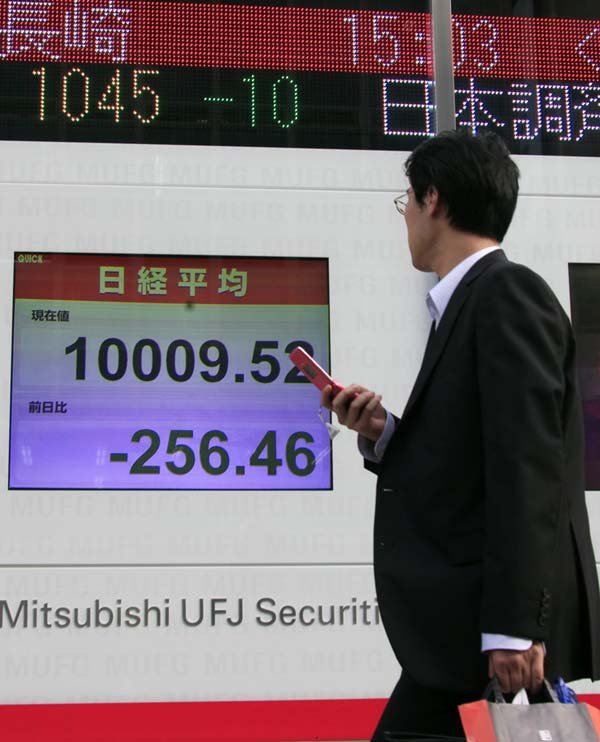TOKYO — The yen surged to a nine-month high Monday amid signals from Japan's new government that it will tolerate a strong currency as it seeks to reduce reliance on exports in the world's No. 2 economy.
The dollar sank as low as 88.22 yen in early Tokyo trading, the lowest since mid-December 2008, before recovering to 89.58. Stock investors were rattled with the benchmark Nikkei 225 index losing 2.5 percent to 10,009.52 as exporters tumbled.
For decades, the Liberal Democratic Party favored a weaker yen to boost the competitiveness of exporters like Toyota Motor Corp.and Sony Corp., whose overseas income shrinks from a strong yen. Many exporters have based their earnings forecasts on the assumption that $1 buys an average of 95 yen.
But Finance Minister Hirohisa Fujii, installed earlier this month as part of the new government under the Democratic Party of Japan, has made waves by saying that a stronger yen has merits, including giving Japanese consumers greater buying power for imports. The party swept to power in national elections last month, ending nearly 50 years of uninterrupted rule by the Liberal Democratic Party.
Fujii has suggested he is opposed to intervening in the currency market to weaken the yen's value - which traders have interpreted to mean that Tokyo won't be following a "weak yen policy," said Yuji Saito, head of foreign exchange at Societe Generale.
The apparent shift in the new government's approach toward currencies reflects the Democratic Party of Japan's objective to make the economy less reliant on exports and put families and consumers at the center of Japan's economic policy, not big business.
"They're trying to achieve a more balanced approach to growth, one that is less export-dependent," said Richard Jerram, chief economist at Macquarie Securities in Tokyo.
Calls to "rebalance" economies across Asia have gained more traction because of the global recession - which spotlighted how heavily reliant Japan and other Asian nations have become on demand from the West. Earlier this month, Bank of Japan Gov. Masaaki Shirakawa also suggested that in the medium and long term, a strong yen can benefit Japan, although he didn't elaborate.
On Monday, Fujii sought to temper his comments, calling for exchange rate "stability" and saying the yen "has been rising somewhat one-sidedly," according to Kyodo news agency.
Many experts say that allowing the yen to strengthen is the last thing Japan needs. The economy is mired in a slump with record unemployment. Many of Japan's big exporters, including Toyota and Sony, have cut thousands of jobs.
"A stronger yen slows down the growth rate," said Jerram. "The larger export manufacturers are a major dynamic for employment."
While Toyota certainly doesn't welcome the yen's appreciation, the company is better equipped to deal with it than five or 10 years ago because it has shifted more production overseas, said Paul Nolasco, a company spokesman.
"That doesn't mean we can absorb every bullet that comes our way, but we feel better prepared than we were before," he said.
Toyota last year produced slightly more vehicles overseas than in Japan, whereas 10 years ago domestic production was more than twice as large as abroad.
Nolasco said that Toyota didn't have any comment on exchange rate policy. Overall, the company was more concerned about whether there would be a recovery in auto sales than currency swings.
"No. 1, are people going to be buying cars again this year? What's 2010 going to look like? That's more important to us now," he said.
With the end of the fiscal first half approaching, many exporters are now repatriating funds, further fueling the yen's climb, analysts said.
Another factor behind the dollar's fall was the agreement at the Group of 20 summit in Pittsburgh on continued stimulus measures, which sent the message to the markets that interest rates were unlikely to rise in the U.S. Higher interest rates often increase the allure of that country's currency.
Information for this article was contributed by Malcolm Foster and Yuri Kageyama of The Associated Press.
Business, Pages 19, 24 on 09/29/2009

